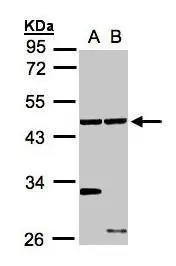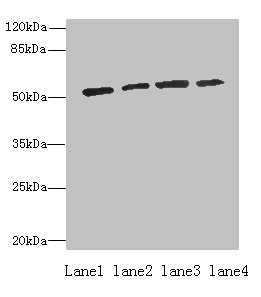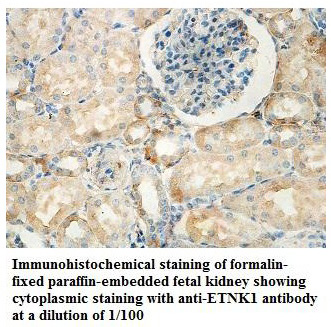![ETNK1 antibody [N2C3] detects ETNK1 protein at cytosol on H358 xenograft by immunohistochemical analysis. Sample: Paraffin-embedded H358 xenograft. ETNK1 antibody [N2C3] (GTX105887) dilution: 1:500.
Antigen Retrieval: Trilogy? (EDTA based, pH 8.0) buffer, 15min ETNK1 antibody [N2C3] detects ETNK1 protein at cytosol on H358 xenograft by immunohistochemical analysis. Sample: Paraffin-embedded H358 xenograft. ETNK1 antibody [N2C3] (GTX105887) dilution: 1:500.
Antigen Retrieval: Trilogy? (EDTA based, pH 8.0) buffer, 15min](https://www.genetex.com/upload/website/prouct_img/normal/GTX105887/GTX105887_39946_IHC_w_23060120_702.webp)
ETNK1 antibody [N2C3] detects ETNK1 protein at cytosol on H358 xenograft by immunohistochemical analysis. Sample: Paraffin-embedded H358 xenograft. ETNK1 antibody [N2C3] (GTX105887) dilution: 1:500.
Antigen Retrieval: Trilogy? (EDTA based, pH 8.0) buffer, 15min
ETNK1 antibody [N2C3]
GTX105887
ApplicationsWestern Blot, ImmunoHistoChemistry, ImmunoHistoChemistry Paraffin
Product group Antibodies
ReactivityHuman, Mouse
TargetETNK1
Overview
- SupplierGeneTex
- Product NameETNK1 antibody [N2C3]
- Delivery Days Customer9
- Application Supplier NoteWB: 1:500-1:3000. IHC-P: 1:100-1:1000. *Optimal dilutions/concentrations should be determined by the researcher.Not tested in other applications.
- ApplicationsWestern Blot, ImmunoHistoChemistry, ImmunoHistoChemistry Paraffin
- CertificationResearch Use Only
- ClonalityPolyclonal
- Concentration0.94 mg/ml
- ConjugateUnconjugated
- Gene ID55500
- Target nameETNK1
- Target descriptionethanolamine kinase 1
- Target synonymsEKI, EKI 1, EKI1, Nbla10396, ethanolamine kinase 1, putative protein product of Nbla10396
- HostRabbit
- IsotypeIgG
- Protein IDQ9HBU6
- Protein NameEthanolamine kinase 1
- Scientific DescriptionThis gene encodes an ethanolamine kinase, which functions in the first committed step of the phosphatidylethanolamine synthesis pathway. This cytosolic enzyme is specific for ethanolamine and exhibits negligible kinase activity on choline. Alternative splicing results in multiple transcript variants encoding distinct isoforms. [provided by RefSeq]
- ReactivityHuman, Mouse
- Storage Instruction-20°C or -80°C,2°C to 8°C
- UNSPSC41116161





